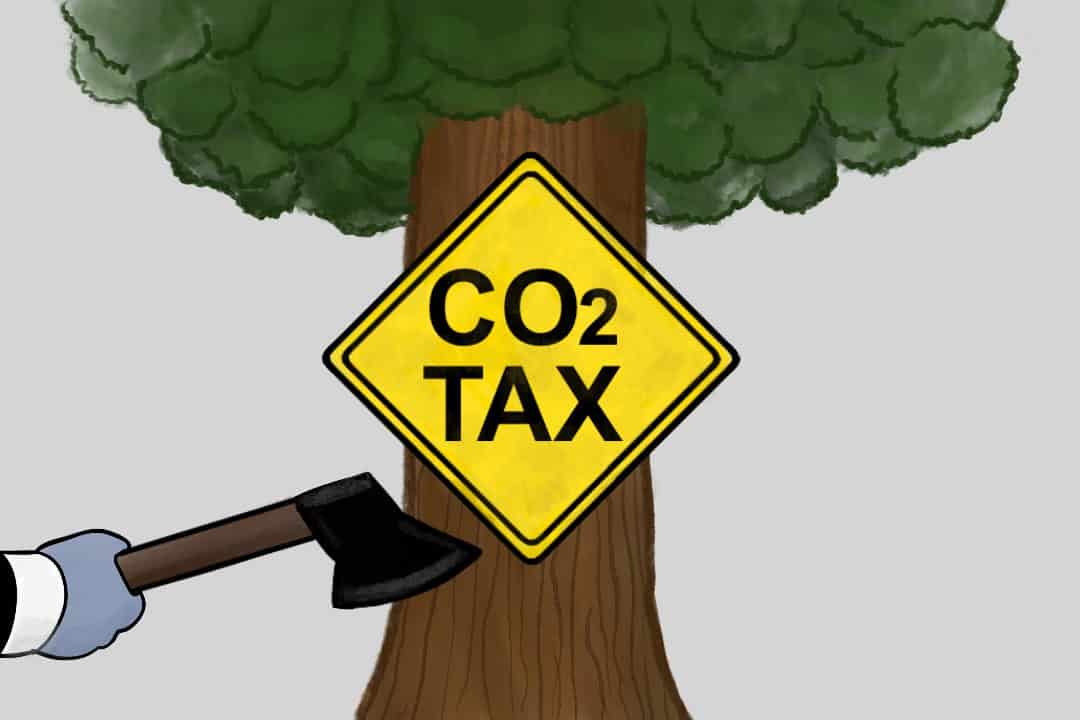It seems as though Conservative Party leader Pierre Poilievre has made “axe the tax” his party’s new mantra. From T-shirts to posters and even motions in Parliament, the mantra has become widely recognizable as one of Poilievre’s primary political goals.
By threatening to end the price on pollution, more commonly known as the carbon tax, I believe Poilievre would reverse significant progress that our nation has made since we signed the 2016 Paris Agreement: an international treaty committed to limiting global warming. Though his infamous catch-phrase may appear harmless, the Conservative’s plans to “axe the tax” without any alternative system would ensure a future of what I believe to be a climate catastrophe.
The carbon tax explained
Prime Minister Justin Trudeau first announced his promise to implement a “price on carbon” during the 2015 federal election campaigns. The Liberal Party fulfilled this promise by passing the Greenhouse Gas Pollution Pricing Act in 2018, which creates a tax system to disincentivize fossil fuel use and reduce Canadian carbon emissions. This carbon tax sets a price for each tonne of carbon dioxide-equivalent emissions that Canadians produce, and the price increases over time to promote the gradual transition towards renewable energy.
Poilievre argues that the carbon tax “is an existential threat to our economy and our way of life.” He believes that due to the tax, “inflation would run rampant and people would not be able to leave their homes or drive anywhere,” which would lead to “mass hunger and malnutrition.”
However, what Poilievre fails to mention is that the carbon tax also returns money to Canadians through the Canada Carbon Rebate, which provides tax rebates in eight provinces to offset the cost of the additional tax at the pumps. Despite what Poilievre might want Canadians to think, around 80 per cent of households receive more money from the rebate than they pay in tax.
I believe this rebate program demonstrates that carbon pricing does not have to come at the expense of working- and middle-class Canadians, and that we can both reduce greenhouse gas emissions while avoiding Poilievre’s potentially alarming future.
Current climate projections
In 2019, the former President of the United Nations General Assembly María Fernanda Espinosa Garcés said “We are the last generation that can prevent irreparable damage to our planet,” stressing that we have until 2030 to “to avert catastrophe.” It is evident that the decisions governments make — or fail to make — in the next decade to reduce greenhouse gas emissions will define our planet’s climate for generations to come.
A 2024 study by the Canadian Climate Institute indicates that Canada is on track to reduce emissions by as much as 50 per cent by 2030, largely thanks to the price of pollution. This means we will achieve up to 90 per cent of our 2030 emissions target.
This is considerably better than the average of the 195 countries that signed the Paris Agreement, which — if no changes are made — are predicted to collectively increase global greenhouse gas emissions by nine per cent within the same timeframe.
Future forecasts
To my surprise, NDP leader Jagmeet Singh ended the supply-and-confidence agreement with Trudeau’s government on September 4. The supply-and-confidence deal, signed in 2021, pledged the NDP’s support for all budget votes and confidence motions that the Liberals attempted to pass.
Although it does not seem likely that the NDP will vote with the Conservatives on future non-confidence motions anytime soon — which could topple the Liberals and replace them with a Conservative government if passed — we should still caution against the looming threat of an early federal election as Poilievre continues to table more motions of non-confidence.
Furthermore, recent polling from CBC projects that the Conservatives have a 96 per cent chance of winning a majority government in the next federal election, which I believe could exacerbate the environmental crisis.
Hundreds of thousands of Canadians across the country are already facing the realities of the climate crisis, with weather-related disasters becoming three times more common in Canada between 2010–2019 compared to the 1980s. Events like these have already cost Canadians over $18 billion in insured losses within that decade. As climate disasters rise, this cost is bound to increase.
I urge Canadians planning to support Poilievre in the next federal election to critically consider the potential long-term environmental impacts. Although the Conservative Party may promise to “axe the tax” to cut costs for Canadians, this short-term gain will lead to long-term consequences for many Canadians — affecting both their pocketbooks and the planet they call home.
Ahmed Hawamdeh is a third-year student at Trinity College studying public policy, political science, and French. He is the Domestic Affairs Columnist for the Opinion section.


